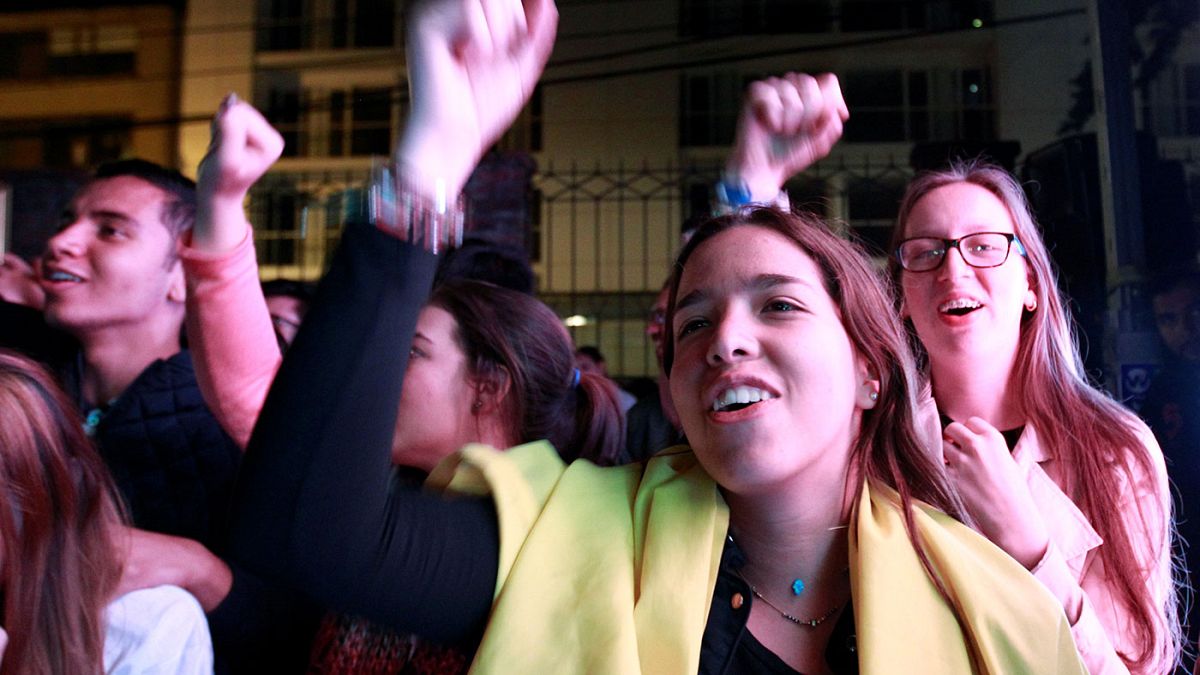Work will begin on Monday to revive a plan to end the 52-year conflict between the Colombian government and the country's Marxist FARC guerrillas
Work will begin in earnest on Monday to revive a peace plan to end the 52-year conflict between the Colombian government and the country’s Marxist Revolutionary Armed Forces of Colombia (“FARC”) guerrillas.
Voters rejected the landmark deal as too lenient on the rebels in a popular vote on Sunday.
The shock result has plunged the country into uncertainty.
Regions still in the grip of the conflict, including poor areas along the Pacific and Caribbean coasts, voted resoundingly in favour of the deal.
Formerly violent interior areas pacified during the Uribe presidency largely backed the “No” camp.
via
ronanburtenshaw</a>: The areas of Colombia most affected by the war voted for peace while the relatively untouched centre voted against. <a href="https://t.co/Q66tj5jG9Y">pic.twitter.com/Q66tj5jG9Y</a></p>— Sally Hayden (sallyhayd) October 2, 2016
The “No” vote may delay government plans to focus on other policy areas including much-needed tax reform and other macro-economic measures to offset the drop in oil income.
It will also dent hopes of encouraging a boom in foreign investment in mining, oil and agriculture in Latin America’s fourth-largest economy.
The FARC deal in five
- Latin America’s longest conflict
- Has claimed the lives of 220,000
- Four-year peace negotiations
- Agreed last month and signed a week ago
- Gave the FARC the chance to hand their weapons in to the UN, confess their crimes and found a political party with Marxist roots
The sticking points
Jail terms
Under the terms of the deal, the FARC would have been able to compete in the 2018 presidential and legislative elections.
The group would also have had 10 unelected congressional seats, guaranteed until 2026.
This angered “No” campaigners who argued the rebels should serve jail terms and not be allowed to enter politics.
The FARC has refused to serve traditional jail terms.
“We all want peace, nobody wants violence. We ask that there be no violence, that the FARC be given protection and they stop all their crimes, including drug-trafficking and extortion,” said former Colombian President Alvaro Uribe.
Assets
The FARC had already softened its stance in the original negotiation.
The group publicly admitted for the first time it trafficked drugs, recruited minors and committed human rights violations, including massacres.
However, voters were worried the rebels would fail to turn over assets from drugs and illegal mining.
This would potentially give them a formidable war chest that could outstrip the coffers of traditional political parties.
“No Plan B” – so which way now?
Colombian President Juan Manuel Santos plans to meet all political parties on Monday.
He will send lead government peace negotiator Humberto de la Calle back to Havana to speak to the FARC leadership.
Santos has said there is no Plan B for the failure of the plebiscite vote.
However, he now appears to be considering other options.
What have the FARC said?
Rodrigo London, the top FARC commander who is better known by his nom-de-guerre, “Timochenko” says the rebels remain committed to becoming a peaceful political party.
What they are saying
“I will not give up, I will keep seeking peace until the last minute of my term,” – President Juan Manuel Santos puts on a brave face.
“The FARC reiterates its disposition to use only words as a weapon to build toward the future. Count on us, peace will triumph,” – FARC commander Rodrigo London, aka “Timochenko”.
“In the end, the people have spoken: the Colombian government and the FARC have no choice but to renegotiate,” – Peter Schechter, director of the Adrienne Arsht Latin American Center.
“We never thought this could happen. Now I just hope the government, the opposition and the FARC come up with something intelligent that includes us all,” – sociologist and “No” voter Mabel Castano.
“How sad. It seems Colombia has forgotten about the cruelty of war, our deaths, our injured, our mutilated, our victims and the suffering we have all lived through with this war,” – “Yes” campaigner Adriana Rivera.
